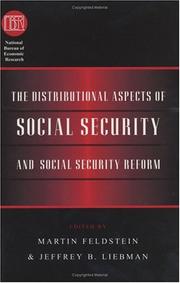| Listing 1 - 2 of 2 |
Sort by
|

ISBN: 1281125571 9786611125578 0226241890 9780226241890 9780226241067 0226241068 9781281125576 0226241068 6611125574 Year: 2002 Publisher: Chicago University of Chicago Press
Abstract | Keywords | Export | Availability | Bookmark
 Loading...
Loading...Choose an application
- Reference Manager
- EndNote
- RefWorks (Direct export to RefWorks)
Social security is the largest and perhaps the most popular program run by the federal government. Given the projected increase in both individual life expectancy and sheer number of retirees, however, the current system faces an eventual overload. Alternative proposals have emerged, ranging from reductions in future benefits to a rise in tax revenue to various forms of investment-based personal retirement accounts. As this volume suggests, the distributional consequences of these proposals are substantially different and may disproportionately affect those groups who depend on social security to avoid poverty in old age. Together, these studies persuasively show that appropriately designed investment-based social security reforms can effectively reduce the long-term burden of an aging society on future taxpayers, increase the expected future income of retirees, and mitigate poverty rates among the elderly.
Social security --- Pension trusts --- Privatization --- Finance --- Investments --- change, progress, economy, economics, welfare, safety net, government, federal, retirement, poverty, life expectancy, retiree, pension, benefits, taxes, revenue, united states, usa, america, american, politics, political, investment, account, proposal, distribution, aging, privatization, income, wealth, money, monetary, healthcare, inequality, mortality.
Book
ISBN: 1283100312 9786613100313 1400838746 9781400838745 9780691149486 0691149488 9781283100311 6613100315 Year: 2011 Publisher: Princeton, NJ
Abstract | Keywords | Export | Availability | Bookmark
 Loading...
Loading...Choose an application
- Reference Manager
- EndNote
- RefWorks (Direct export to RefWorks)
It's a commonplace that citizens in Western democracies are disaffected with their political leaders and traditional democratic institutions. But in Democratic Legitimacy, Pierre Rosanvallon, one of today's leading political thinkers, argues that this crisis of confidence is partly a crisis of understanding. He makes the case that the sources of democratic legitimacy have shifted and multiplied over the past thirty years and that we need to comprehend and make better use of these new sources of legitimacy in order to strengthen our political self-belief and commitment to democracy. Drawing on examples from France and the United States, Rosanvallon notes that there has been a major expansion of independent commissions, NGOs, regulatory authorities, and watchdogs in recent decades. At the same time, constitutional courts have become more willing and able to challenge legislatures. These institutional developments, which serve the democratic values of impartiality and reflexivity, have been accompanied by a new attentiveness to what Rosanvallon calls the value of proximity, as governing structures have sought to find new spaces for minorities, the particular, and the local. To improve our democracies, we need to use these new sources of legitimacy more effectively and we need to incorporate them into our accounts of democratic government. An original contribution to the vigorous international debate about democratic authority and legitimacy, this promises to be one of Rosanvallon's most important books.
Legitimacy of governments. --- Democracy. --- Governments, Legitimacy of --- Legitimacy (Constitutional law) --- Consensus (Social sciences) --- Revolutions --- Sovereignty --- State, The --- General will --- Political stability --- Regime change --- Self-government --- Political science --- Equality --- Representative government and representation --- Republics --- Democracy --- Legitimacy of governments --- Western democracy. --- administration. --- administrative-executive power. --- appropriation. --- bureaucracies. --- bureaucracy. --- care. --- citizens. --- civic life. --- constitution. --- constitutional courts. --- constitutional judges. --- constitutional oversight. --- constitutional review. --- constitutional thought. --- corporatism. --- countermajoritarian difficulty. --- democracy. --- democratic authority. --- democratic ideals. --- democratic impartiality. --- democratic institution. --- democratic institutions. --- democratic legitimacy. --- democratic systems. --- derivative legitimacy. --- direct relations. --- dual legitimacy. --- elections. --- electoral legitimation. --- electoral politics. --- executive functions. --- flexible relations. --- general interest. --- generality. --- government initiatives. --- government intervention. --- government. --- identification. --- identity politics. --- immediate democracy. --- impartiality. --- independent authorities. --- independent commissions. --- indirect democracy. --- informal relations. --- interactive democracy. --- judicial power. --- judicial powers. --- legitimacy. --- majority rule. --- modern individualistic states. --- multiplication. --- new democratic institutions. --- numerical unanimity. --- oversight function. --- participatory democracy. --- particularity. --- pluralization. --- political community. --- political investment. --- political leaders. --- political legitimacy. --- political obligation. --- political representatives. --- presence. --- proximity. --- rational administration. --- reflexive democracy. --- reflexivity. --- regulatory function. --- representation. --- social existence. --- social expectations. --- social gaze. --- substantive unanimity. --- unanimity. --- unelected judges. --- unpolitical democracy.
| Listing 1 - 2 of 2 |
Sort by
|

 Search
Search Feedback
Feedback About UniCat
About UniCat  Help
Help News
News